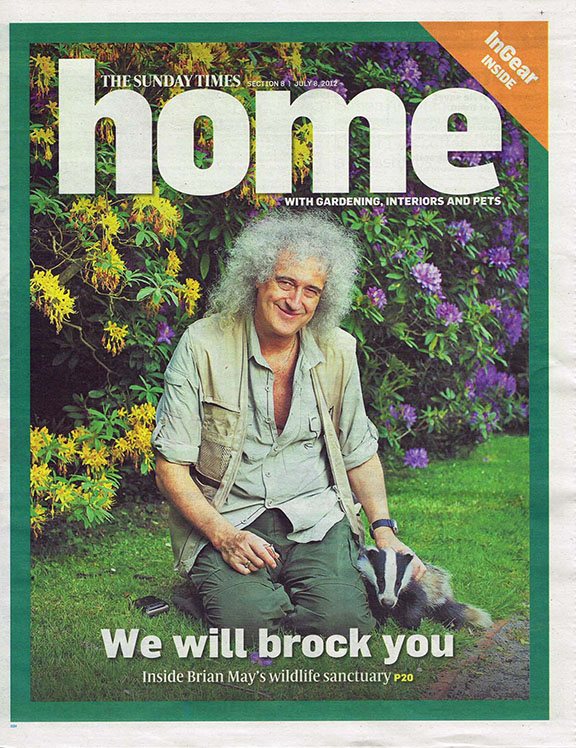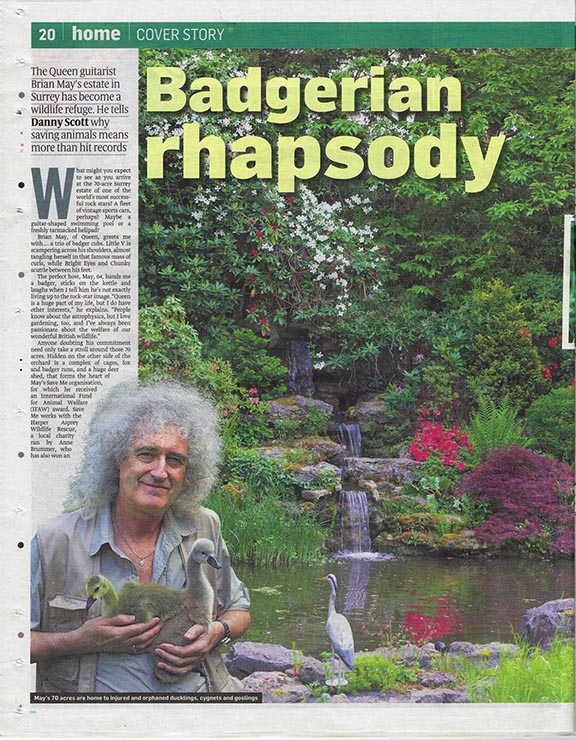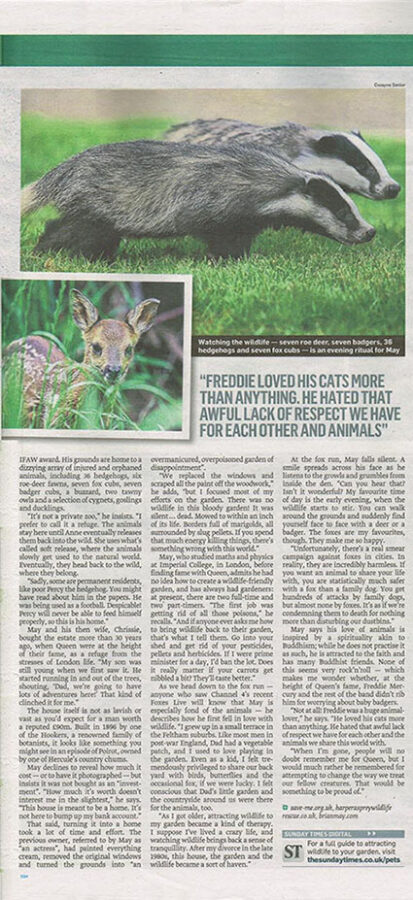THE SUNDAY TIMES
8 July 2012 by Danny Scott
HOME – COVER STORY
Inside Brian May’s wildlife sanctuary
The Queen guitarist Brian May’s estate in
Surrey has become a wildlife refuge. He tell
Danny Scott why saving animals means
more than hit records.
[CLICK ON IMAGES FOR LARGER – open in new windows]
What might you expect to see as you arrive at the 7 acre Surrey estate of one of the world’s most successful rock stars? A fleet of vintage sports cars, perhaps? Maybe a guitar-shaped swimming pool or a freshly tarmacked helipad?
Brian May, of Queen, greeted me with … a trio of badger cubs. Little V is scampering across his shoulders, almost tangling herself in that famous mass of curls, while Bright Eyes and Chunky scuttle between his feet.
The perfect host, May, 64, hands me a badger, sticks on the kettle and laughs when I tell him he’s not exactly living up to the rock-star image. “Queen is a huge part of my life, but I do have other interests”, he explains. “People know about the astrophysics, but I love gardening, too, and I’ve always been passionate about the welfare of our wonderful British wildlife.”
Anyone doubting his commitment need only take a stroll around those 70 acres. Hidden on the other side of the orchard is a complex of cages, fox and badger runs, and a huge deer shed, that forms the heart of May’s Save-Me organisation, for which he received an International Fund for Animal Welfare (IFAW) Award. Save Me works with the Harper Asprey Wildlife Rescue, a local charity run by Anne Brummer, who has also won an IFAW award. His grounds are a home to a dizzying array of injured and orphaned animals, including 36 hedgehogs, six roe-deer fawns, seven fox cubs, seven badger cubs, a buzzard, two tawny owls and a selection of cygnets, goslings and ducklings.
“It’s no a private zoo,” he insists. “I prefer to call it a refuge. The animals stay here until Anne eventually releases them back into the wild. She uses what’s called soft release, where the animals slowly get used to the natural world. Eventually, they head back to the wild, where they belong.
“Sadly, some are permanent residents, like poor Percy the hedgehog. You might have read about him in the papers. He was being used as a football. Despicable! Percy will never be able to feed himself so this is his home.”
May and his then wife, Chrissie, bought the estate more the 30 years ago, when Queen were at the height of their fame, as a refuge from the stresses of London life. “My son was still young when we first saw it. He started running in and out of the trees, shouting, ‘Dad, we’re going to have lots of adventures here!’ That kind of clinched it for me.”
The house itself is not as lavish or vast as you’d expect for a man worth a reputed £90m. Built in 1896 by one of the Hookers, a renowned family of botanists, it looks like something you might see in an episode of Poirot, owned by one of Hercule’s country chums.
May declines to reveal how much it cost – or to have it photographed – but insists it was not bought as an “investment”. “How much it’s worth doesn’t interest me in the slightest,” he says. “This house is meant to be a home. It’s not here to bump up my bank account.”
That said, turning it into a home took a lot of time and effort. The previous owner, referred to by May as “an actress”, had painted everything cream, removed the original windows and turned the grounds into “an over manicured, over poisoned garden of disappointment”.
“We replaced the windows and scraped all the paint off the woodwork,” he adds, “but I focused most of my efforts on the garden. Three was no wildlife in this bloody garden! It was silent . . . dead. Mowed to within an inch of its life. Borders full of marigolds, all surrounded by slug pellets. If you spend that much energy killing things, there’s something wrong with this world.”
May, who studied maths and physics at Imperial College, in London, before finding fame with Queen, admits he had no idea how to create a wildlife-friendly garden, and has always had gardeners: at present two full-time and two part-timers. “The first job was getting rid of all those poisons,” he recalls. “And if anyone ever asks me how to bring wildlife back to their garden, that’s what I tell them. Go into your shed and get rid of your pesticides, pellets and herbicides. If I were prime minister for a day, I’d ban the lot. Does it really matter if you carrots get nibbled a bit? They’ll taste better.”
As we head down to the fox run – anyone who saw Channel 4’s recent ‘”Foxes Live”‘ will know that May is especially fond of the animals – he describes how he first fell in love with wildlife. “I grew up in a small terrace in the Feltham suburbs. Like most men in post-war England, Dad had a vegetable patch, and I used to love playing in the garden. Even as a kid, I felt tremendously privileged to share our back yard with birds, butterflies and the occasional fox, if we were lucky. I felt conscious that Dad’s little garden and the countryside around us were there for the animals, too.
“As I got older, attracting wildlife to my garden became a kind of therapy. I suppose I’ve lived a crazy life, and watching wildlife brings back a sense of tranquility. After my divorce in the late 1980s, this house, the garden and the wildlife became a sort of haven.”
At the fox run, May falls silent. A smile spreads across his face as he listens to the growls and grumbles from inside the end. “Can you hear that? Isn’t it wonderful? My favourite time of day is the early evening, when the wildlife starts to stir. You can walk around the ground and suddenly find yourself face to face with a deer or a badger. The foxes are my favourites, though. They make me happy.
“Unfortunately, there’s a real smear campaign against foxes in cities. In reality, they are incredibly harmless. If you want an animal to share your life with, you are statistically much safer with a fox than a family dog. You get hundreds of attacks by family dogs, but almost none by foxes. It’s as if we’re condemning them to death for nothing more than disturbing our dustbins.”
May says his love of animals is inspired by a spirituality akin to Buddhism; while he does not practise it as such, he is attracted to the faith and has many Buddhist friends. None of these seems very rock’n’roll – which makes me wonder whether, at the height of Queen’s fame, Freddie Mercury and the rest of the band didn’t rib him for worrying about baby badgers.
“Not at all! Freddie was a huge animal lover,” he says. “He loved his cats more than anything. He hated that awful lack of respect we have for each other and the animals we share this word with.
“When I’m gone, people will no doubt remember me for Queen, but I would much rather be remembered for attempting to change the way we treat our fellow creatures. That would be something to be proud of.”
Information:
– Save Me Trust
– Harper Asprey Wildlife Rescue
– BrianMay.com
SUNDAY TIMES DIGITAL
For a full guide to attracting wildlife to your garden, visit thesundaytimes.co.uk/pets – <LINK NO LONGER AVAILABLE>


